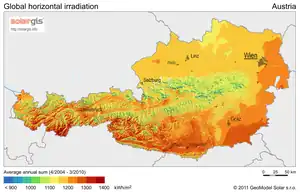As of the end of 2022, solar power in Austria amounted to nearly 3.8 gigawatt (GW) of cumulative photovoltaic (PV) capacity, with the energy source producing 4.2% of the nation's electricity.[1][2]
In addition to supporting PV installations through permitting simplification and cash grants, the Austrian government is targeting 100% renewable electricity generation by 2030.[3][4]

In 2009, the site of Zwentendorf power station became Austria's largest solar power station with an investment of 1.2 million Euro, with the addition of 1,000 photovoltaic panels.[5] Zwentendorf was intended to be Austria's first nuclear power plant, but after a vote in 1978 prohibiting nuclear power in Austria, was never completed.[6] In September, 2011, Austria's largest solar power station, 2 MW, was under construction in the Niedere Tauern mountain range.[7]
Austria has also a large capacity of solar heating at its disposal. With more than 3,500 MWthermal the country ranks second in the EU, only behind much larger Germany.[8]
Targets
Austria aims to achieve a 100% renewable electricity production by 2030 with 1,000,000 homes having solar panels fitted by that date. 11 TWh of extra photovoltaics will be needed above 2021 levels.[9]
Photovoltaic installations
Statistics
| Austria 2013 - key figures | |||
|---|---|---|---|
| Final Electricity Consumption | 56 TWh | ||
| Inhabitants | 8 million | ||
| Irradiation | 1,027 kWh/kW | ||
| PV Installations in 2013 | 263 MW | ||
| PV Cumulative Capacity in 2013 | 626 MW | ||
| PV Penetration | 1.1% | ||
| Source: IEA-PVPS, Trends2014[10] | |||
| Year | Added (MWp) |
Cumulative (MWp) |
Refs |
|---|---|---|---|
| 1999 | 0.8 | 3.7 | Trends2013 |
| 2000 | 1.2 | 4.9 | Trends2013 |
| 2001 | 1.6 | 6.5 | Trends2013 |
| 2002 | 3.8 | 10.3 | Trends2013 |
| 2003 | 6.5 | 16.8 | Trends2013 |
| 2004 | 4.3 | 21.1 | Trends2013 |
| 2005 | 2.9 | 24.0 | Trends2013 |
| 2006 | 1.6 | 25.6 | Trends2013 |
| 2007 | 3.1 | 28.7 | Trends2013 |
| 2008 | 3.7 | 32.4 | Trends2013 |
| 2009 | 20.2 | 52.6 | Trends2013 |
| 2010 | 42.9 | 95.5 | Trends2013 |
| 2011 | 91.7 | 187.2 | Trends2013 |
| 2012 | 176 | 362.9 | Trends2013 |
| 2013 | 263 | 626 | Trends2014 |
| 2014 | 140 | 766 | Snapshot2014 |
| 2015 | 171 | 937 | Snapshot2020 |
| 2016 | 159 | 1096 | Snapshot2020 |
| 2017 | 131 | 1268 | Snapshot2020 |
| 2018 | 187 | 1455 | Snapshot2020 |
| 2019 | 247 | 1702 | Snapshot2020 |
| 2020 | 341 | 2043 | energie.gv.at |
| 2021 | 740 | 2783 | energie.gv.at |
| 2022 | 1009 | 3792 | energie.gv.at |
| Source: IEA-PVPS, Trends2013,[11] Trends2014,[10] Snapshot2014[12] Snapshot2020[13] energie.gv.at[14] | |||
See also
References
- ↑ Anu Bhambhani (2023-06-27). "PV Austria Say Country Exceeded 1 GW PV Capacity For 1st Time, Taking Cumulative To 3.8 GW". Taiyang News. Retrieved 2023-07-24.
- ↑ "Distribution of electricity generation in Austria in 2022, by source". Statista. 2023-06-30. Retrieved 2023-07-24.
- ↑ Nikolaus J. Kurmayer (2023-01-11). "Austria commits to significant renewables boost". Euractiv. Retrieved 2023-07-24.
- ↑ Kit Gillet (2022-11-21). "Austria steps up funding to accelerate green progress". Financial Times. Retrieved 2023-07-24.
- ↑ History Archived 2012-05-08 at the Wayback Machine
- ↑ Austrian Nuclear Plant Becomes Solar Power Station Archived 2012-07-08 at archive.today
- ↑ Albasolar provides 2MW for the largest solar Park in Austria
- ↑ EurObserv'ER: Solar thermal and concentrated solar power barometer - May 2014
- ↑ "Austrian Recovery & Resilience Plan / 1.Sustainable Construction / Climate neutral transformation - Renewable Expansion Act". 26 April 2023.
- 1 2 "IEA PVPS TRENDS 2014 in Photovoltaic Applications" (PDF). iea-pvps.org. 12 October 2014. p. 23. Archived (PDF) from the original on 28 December 2014.
- ↑ "IEA PVPS TRENDS 2013 in Photovoltaic Applications" (PDF). iea-pvps.org. 29 November 2013. p. 39. Archived (PDF) from the original on 2 April 2015.
- ↑ "Snapshot of Global PV 1992-2014" (PDF). iea-pvps.org/index.php?id=32. International Energy Agency — Photovoltaic Power Systems Programme. 30 March 2015. Archived from the original on 7 April 2015.
- ↑ "NSR Austria 2020" (PDF). iea-pvps.org/index.php?id=32. International Energy Agency — Photovoltaic Power Systems Programme. 30 March 2015.
- ↑ "Gut zu wissen über Erneuerbare Energie". energie.gv.at. Bundesministeriums für Klimaschutz, Umwelt, Energie, Mobilität, Innovation und Technologie (BMK). 29 July 2023.
